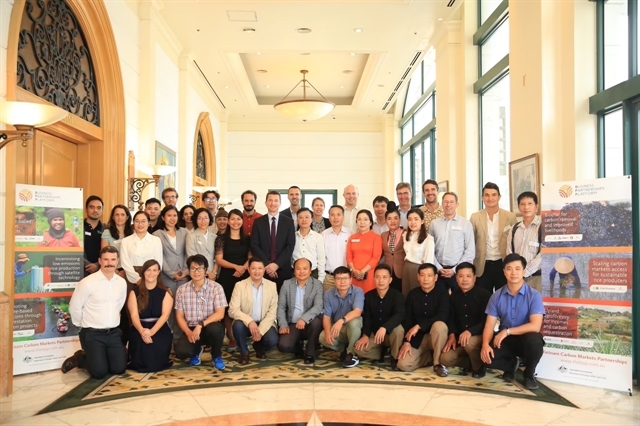 Economy
Economy

 |
| Chargé d’Affairs Mark Tattersall and six new private sector partnerships. — Photo courtesy of Australian Embassy to Việt Nam |
HÀ NỘI — Six new private sector partnerships has announced under the Australian Department of Foreign Affairs and Trade’s (DFAT’s) Business Partnerships Platform (BPP) will promote the growth of sustainable carbon markets that deliver significant social and environmental benefits to communities in Việt Nam.
The six multi-stakeholder partnerships, supported by an investment of US$3.3 million from DFAT, will leverage more than $3.7 million in private sector investment and resources towards improving the enabling environment for carbon markets projects in Việt Nam that are able to deliver verifiable and sustainable social and environmental outcomes.
The new partnerships will test and trial new approaches within voluntary market frameworks to reduce greenhouse gas emissions, lower carbon market entry barriers for producers, build the capacity of local stakeholders, and deliver important social benefits.
“Australia is ambitious for what we can achieve together with Việt Nam, and the region, in confronting the challenges of climate change,” said Chargé d’Affairs, Mark Tattersall. “These new BPP Carbon Markets partnerships are part of Australia’s commitment to supporting enhanced climate action in our region, including through climate partnerships that also work to deliver social and environmental benefits to communities.”
The six partnerships include incentivising low emissions rice production through satellite technology, scaling carbon markets access for sustainable rice producers, enabling nature-based carbon projects, upland crop planting for incomes and carbon sequestration, biochar for carbon removal and improved livelihoods and promoting nature-based solutions through afforestation carbon projects.
The Business Partnerships Platform supports partnerships between DFAT and inclusive, commercially sustainable businesses to deliver strategic development outcomes, with a focus on gender equality, social inclusion and climate impact. Since 2016, the programme has supported 52 partnerships in 18 countries. — VNS




